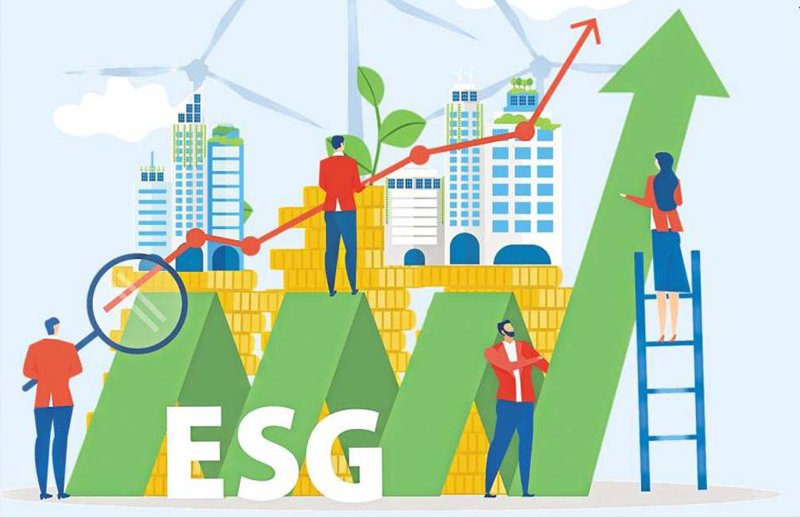
BIX ARTICLE
Benefits and business cases for SME sustainability
Jun 28, 2024
|
5 min read
Featured Posts
Social Bonds Illustrative Use-Of-Proceeds Case Studies Coronavirus
Jul 06, 2020
|
2 min read
Sustainable Banking Network (SBN) Creating Green Bond Markets
Jul 06, 2020
|
2 min read
Why is Inflation Making a Big Comeback After Being Absent for Decades in the U.S.?
Mar 24, 2022
|
7 min read
SC issues Corporate Governance Strategic Priorities 2021-2023
Mar 29, 2022
|
3 min read
 Compiled by ERIC QUAH, [email protected]
Compiled by ERIC QUAH, [email protected]FOR small and medium sized enterprises (SM Es), the high-wire act of ensuring businesses profitability while reducing expenses has always been a prime objective.
Hence for many such businesses, to integrate environmental, social and governance (ESG) into their framework would seem like an extravaganza that only larger companies or multinational corporations can comfortably do.
That is because most SMEs are more concerned with short-term results rather than taking a long view on the subject.
Many may still feel that sustainability is a topic that is handled by governments only and not the private sector.
However, SM Es must consider that the world is undergoing many changes, with marked uncertainty with our climate, our societies and economies around the world.
Rather than thinking that ESG practices are equitable to an expenditure, they should think of that as a long term investment- a journey that can bring them more benefits as time progresses.
Competitive advantage
- One word that is all important for companies big and small is the concept of branding and the positive impact a brand has when it resonates well with its customers.
As such, commanding a strong brand loyalty from customers is the ultimate goal for most companies.
SMEs should then understand that by actually embracing ESG, they would win the respect of many of its already loyal customers and may even onboard new ones who are impressed with their ethical actions and transparency. That would give them an edge over their competitors. In the long run, this would strengthen customer loyalty, marked by a higher likelihood of investments and improved market positioning. - The thoroughness that is required in sustainability data gathering forces businesses to track, measure, and document their sustainability performance.
These protocols also help companies to identify and implement various benchmarks and best practices that are measurable, giving them empirical value for better decision-making in response to volatile market changes. - Using an ESG reporting software can also present itself as a strategic tool for positioning the company as a pioneer in sustainability and establishing itself as distinct among others in the fray. One such tool SM Es can use is the newly released simplified climate assessment tool by the UN Global Compact Network Malaysia & Brunei (UNGCMYB) dubbed "PROGRESS" (refer to p16). With PROGRESS, SMEs can obtain their climate maturity report and a customised climate transition action plan. With this report, SMEs can also gain access to financial incentives that are provided through UNGCMYB's collaboration with Alliance Bank.
Complying with regulations
- Depending on what SMEs are involved in, it is foreseeable that they would be influenced by ESG via a certain regulatory instrument or several.
And while only voluntary, ursa Malaysia and the Securities Commission of Malaysia are eventually introducing more ESG within their reporting framework. Just last October, the Investment, Trade and Industry Ministry (Miti) launched the i-ESG Framework to accelerate the transition toward sustainable practices among manufacturing companies. - Practices and adherences such as these will prove to be more important when the business deals with foreign clients and customers in countries that are stricter in their ESG regulation.
Adhering to established ESG requirements can open up the possibility for local SMEs to trade with foreign counterparts in countries where sustainability is stricter, allowing them to scale up their businesses.
Attracting and retaining top talents
- Having a team who is passionate and loyal to the company is invaluable especially if the management is looking for qualified and committed experts in their line of career.
- Many of these young professionals nowadays look beyond just a good payment package, they aspire to join companies that have ideals and values that align with their own.
- A strong ESG commitment can position an SME as an attractive employer, leading to a more engaged and productive workforce.
Cost savings
- Adopting ESG practices has a way of helping companies improve operational efficiency and innovation ESG protocols would steer companies towards processes that reduce waste, conserve resources and optimise their energy use.
- These practices and innovations translate to more cost savings that justify the implementation of ESG in the first place.
Capital access via funding and partnerships
- As more investors demand more focus on sustainability issues, embracing ESG seems to be a good way to either build partnerships or even gain funding from interested parties.
- Further, certain government agencies and banks offer grants or loans to help SMEs in their ESG journey, such as the Green Technology Financing Scheme from the Malaysian Green Technology and Climate Change Corporation.
Risk reduction
- When a company collects data to monitor each segment of their ESG, such as its carbon emissions. workplace diversity or management transparency, it would find it easier for it to identify and analyse its risks.
- It allows them to pinpoint problem areas at an early stage and take the right action to find appropriate solutions.
The ESG benefits may seem vague and even difficult for SM Es to implement initially, but leveraging such sustainable advantages will undoubtedly help the business grow and expand much more.
Source: Benefits and business cases for SME sustainability (2024, 28 June). The Star. Retrieved from The Star Newspaper, StarESG pg 18
Disclaimer
The information provided in this report is of a general nature and has been prepared for information purposes only. It is not intended to constitute research or as advice for any investor. The information in this report is not and should not be construed or considered as an offer, recommendation or solicitation for investments. Investors are advised to make their own independent evaluation of the information contained in this report, consider their own individual investment objectives, financial situation and particular needs and should seek appropriate personalised financial advice from a qualified professional to suit individual circumstances and risk profile.
The information contained in this report is prepared from data believed to be correct and reliable at the time of issuance of this report. While every effort is made to ensure the information is up-to-date and correct, Bond and Sukuk Information Platform Sdn Bhd (“the Company”) does not make any guarantee, representation or warranty, express or implied, as to the adequacy, accuracy, completeness, reliability or fairness of any such information contained in this report and accordingly, neither the Company nor any of its affiliates nor its related persons shall not be liable in any manner whatsoever for any consequences (including but not limited to any direct, indirect or consequential losses, loss of profits and damages) of any reliance thereon or usage thereof.
YOU MAY ALSO LIKE
ARTICLE
Feb 23, 2026
|
5 min read
ARTICLE
Feb 16, 2026
|
5 min read
ARTICLE
Feb 06, 2026
|
5 min read
ARTICLE
Feb 05, 2026
|
4 min read


